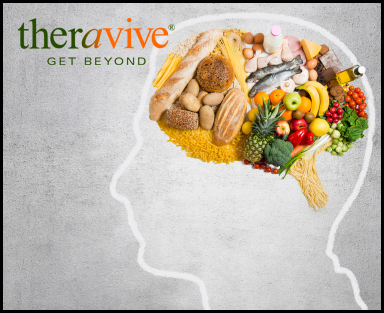 Contrary to the perception that balanced nutrition is only important for physical health; it also plays a vital role in emotional well-being (Bamber, 2007).1 It is a fact that a number of people don’t know that nutrition plays a major role in preventing hormonal imbalances and ensuring good mental health. There is no denying the fact that factors like therapies, counseling and discussing problems with people are very important for peace of mind but without nutritional support, no therapy is effective enough to ensure complete mental health.
Contrary to the perception that balanced nutrition is only important for physical health; it also plays a vital role in emotional well-being (Bamber, 2007).1 It is a fact that a number of people don’t know that nutrition plays a major role in preventing hormonal imbalances and ensuring good mental health. There is no denying the fact that factors like therapies, counseling and discussing problems with people are very important for peace of mind but without nutritional support, no therapy is effective enough to ensure complete mental health.
This article will discuss and highlight some of the major emotional issues due to malnutrition and highlight the importance of proper diet for improved mental health and emotional well-being.
Major Emotional Problems
According to Hanafi (2012)2, malnutrition directly impacts the blood circulation in the human body and improper circulation or decreased levels of oxygen in our body impacts the functioning of vital organs. When it comes to emotional well-being, the brain is in charge to send signals to the body to react to a particular situation. Moreover, proper secretion of hormones also decides the mood control.
 Deficiency of various nutritional elements can cause mild to severe emotional issues. Below is the list of four major and frequently encountered emotional issues and solutions for overcoming these issues (Colgan, 1996)3.
Deficiency of various nutritional elements can cause mild to severe emotional issues. Below is the list of four major and frequently encountered emotional issues and solutions for overcoming these issues (Colgan, 1996)3.
1. Anxiety
The study of Harbottle et al. (2008)4, said that this is probably one of the most frequently encountered yet most overlooked mental health issues that directly impact the emotional health of a person. It is a fact people generally try to overcome anxiety by increasing caffeine intake which is a wrong approach. Moreover, it should be kept in mind that disturbed sugar levels in the blood impact the secretion of lactic acid, thus recuing the anxiety threshold.
Treatment
Hanafi said that the best way to cope with anxiety problems through diet is to limit the intake of alcohol and caffeine which only stimulate the brain cells for a temporary period. The study highlighted that a better and more reliable way to permanently cure anxiety is include fruit sugar in the daily diet. For people who are weight conscious or have diabetes problem, oats and starchy cereals can serve the purpose of a healthy sugar source.
2. Mood Swings
Harbottle mentioned in the study that people suffer from a number of emotional traumas due to malnutrition. It is also important to notice that frequent mood swings are often diagnosed as bipolar I and wrong medication further worsens the situation. Colgen said that extremely strict dieting or cutting the fat level to zero lead to abrupt mood swings and uncontrolled frustration.
Treatment
Colgen said that in order to control mood swings, it is very important to balance the levels of Omega 3 fatty acids in the body/ the author said that unlike other forms of cholesterol that can impact heart and increase the risk of cardiovascular diseases, Omega 3 does not contribute in weight gain and ensures improved mental health. According to the author the best sources of Omega 3 are Salmon, walnuts and herring.
3. Depression and Stress
Colgen discussed another major problem which a number of people face due to malnutrition i.e. depression. The author said people often experience mild to severe depression attacks due to decreased levels of serotonin which leads to depressive disorder. II is also mentioned that the fact that without proper nutritional support and proper protein intake, medications and therapies are not effective in controlling depression and stress. People suffering from depressive disorders often complain about sleeplessness and loss of appetite, thus impacting the overall health.
Treatment
Tomlinson et al. (2009)5 highlighted in a study that Tryptophan is a form of amino acid that ensures proper level of depression controlling chemical (serotonin). A number of modern research studies show that this chemical not only ensures proper functioning of hormone secretion glands but also decreases the frequency of depression attacks. According to health experts dairy products and soy are two of the best sources of Tryptophan.
4. Slow Recovery from Trauma
Suffering from mental trauma can be considered normal if the person has an ability to quickly recover from the trauma. Tomlinson highlighted the fact that a number of people don’t know but the ability of recovering from a depressive state of mind heavily depends on balanced diet.
Treatment
The author said that a simple and easy way to ensure quick recovery from stress is to include magnesium-rich vegetables in daily diet. According to many health experts green and leafy vegetables and nuts are the best source of magnesium.
_________________________________________________________________________________________________________________________________
1. Bamber, D.J., Stokes, C.S. and Stephen, A.M. (2007). The role of diet in the prevention and management of adolescent depression.
2. Hanafi N. (2012). Nutrition to Support Emotional Wellbeing and Mental Health by Nutritional Therapist Nicky Seabrook, Based in Suffolk.
3. Colgan M. (1996). Hormonal Health: Nutritional and Hormonal Strategies for Emotional Well-Being & Intellectual Longevity.
4. Harbottle, Lynn, Schonfelder, Nicola. (2008). Nutrition and depression: A review of the evidence.
5. Tomlinson, Diane, Wilkinson, Heather, Wilkinson, Paul. (2009). Diet and Mental Health in Children.
Christie Hunter is registered clinical counselor in British Columbia and co-founder of Theravive. She is a certified management accountant. She has a masters of arts in counseling psychology from Liberty University with specialty in marriage and family and a post-graduate specialty in trauma resolution. In 2007 she started Theravive with her husband in order to help make mental health care easily attainable and nonthreatening. She has a passion for gifted children and their education. You can reach Christie at 360-350-8627 or write her at christie - at - theravive.com.